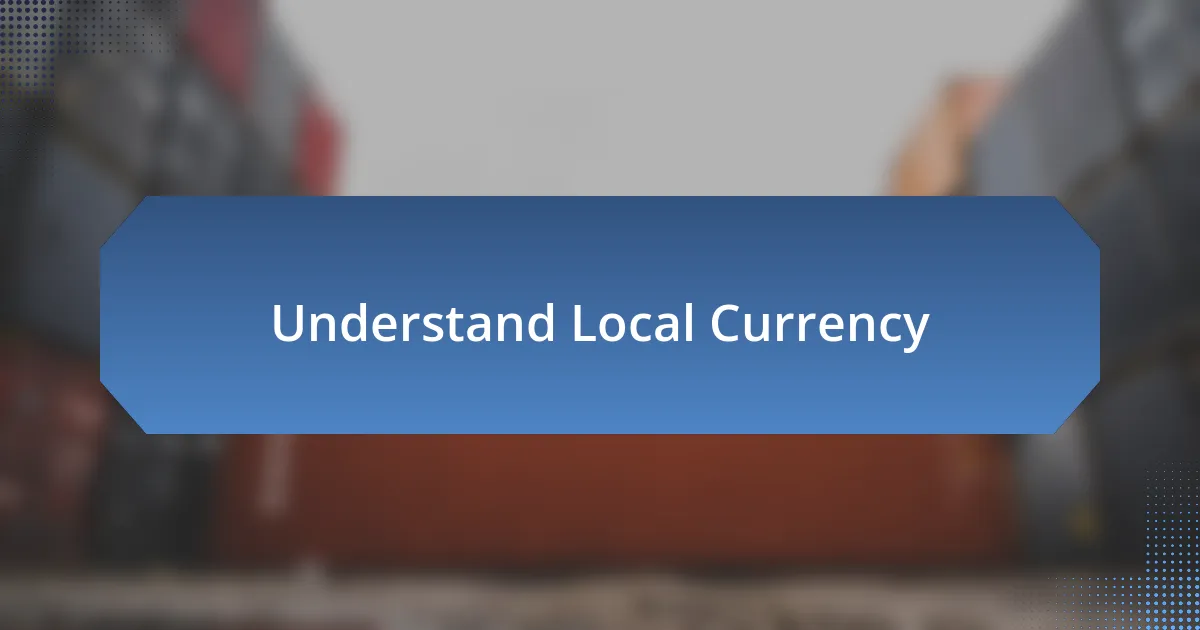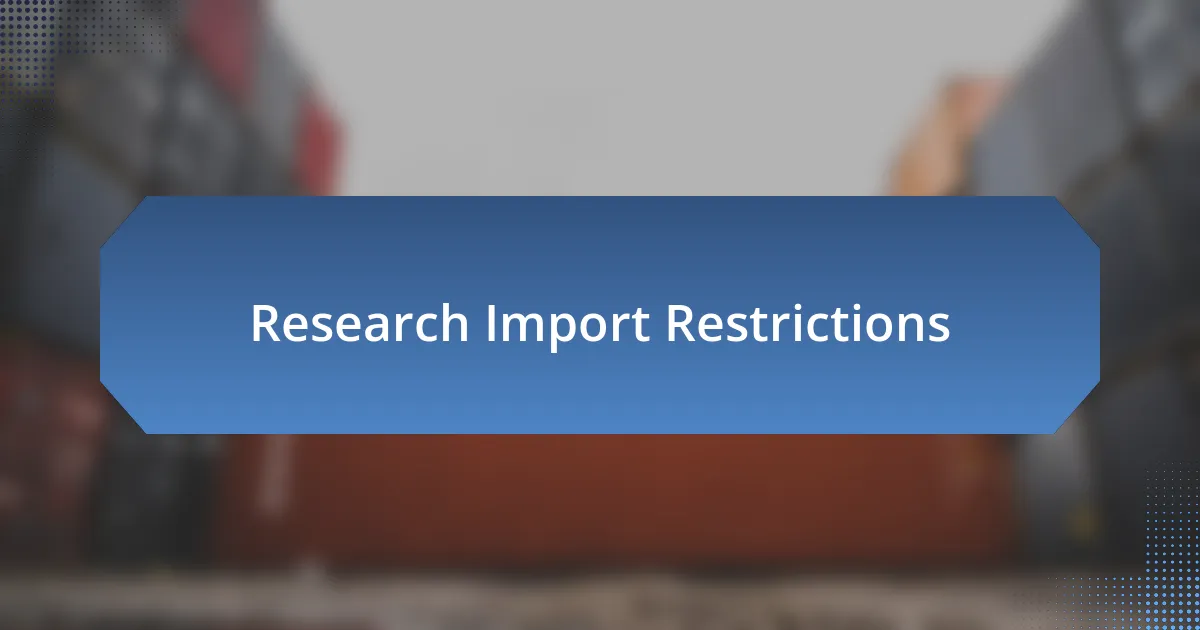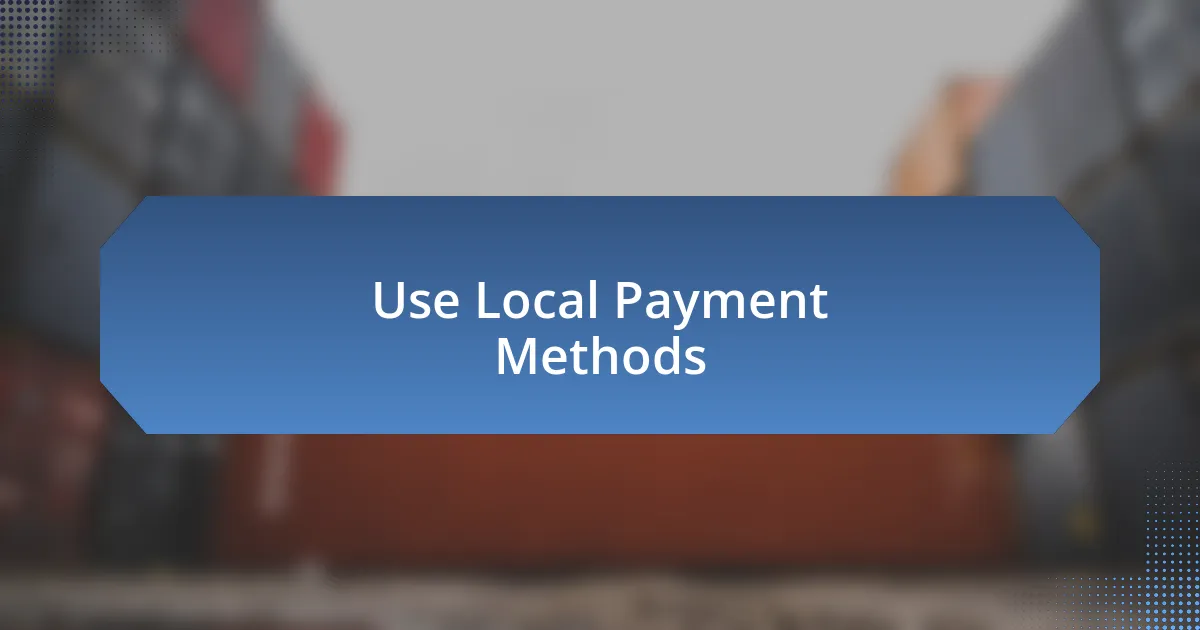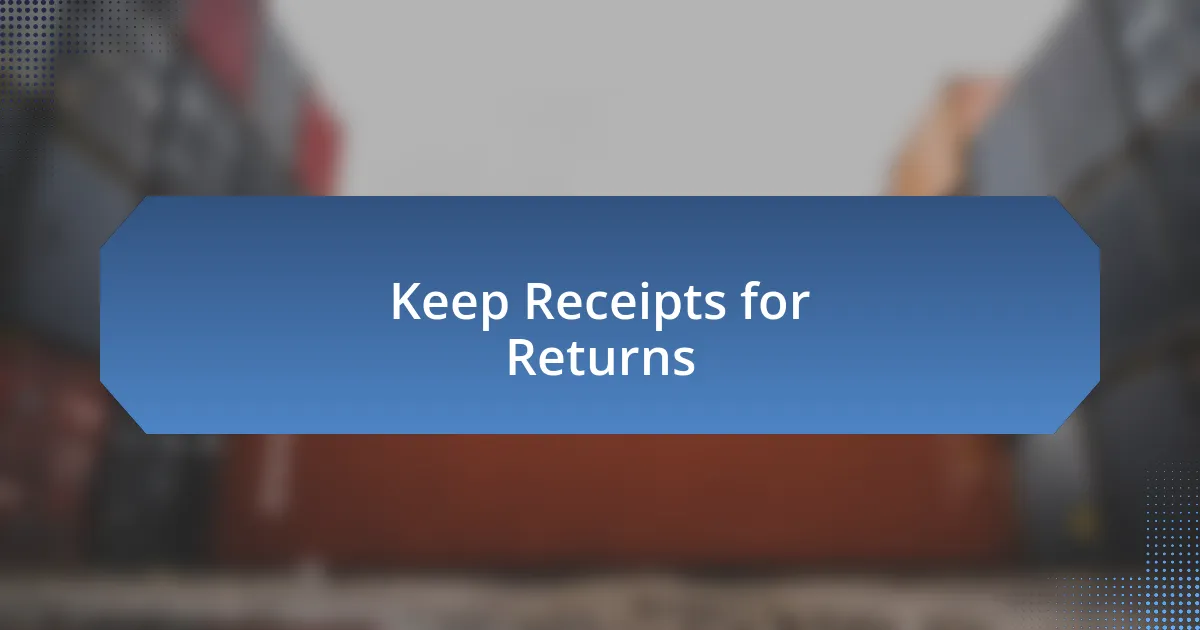Key takeaways:
- Familiarize yourself with local currency and conversion rates to avoid confusion and enhance your shopping experience.
- Research import restrictions and customs regulations to prevent issues at the airport upon returning home.
- Always create a focused shopping list and utilize online price comparison tools to make informed purchasing decisions.
- Keep receipts for all purchases to ensure a smooth return process and to safeguard your finances.

Understand Local Currency
When traveling, one of the first things I do is familiarize myself with the local currency. I remember feeling overwhelmed during my first trip, staring at unfamiliar bills and coins, unsure of how much I was spending. Learning about the currency in advance can save you from the anxiety of guessing prices and the embarrassment of not understanding how to make change.
I often find it helpful to keep a small conversion app on my phone. While strolling through a bustling market, I once relied on it to confirm I wasn’t overpaying for a beautiful handcrafted item. Have you ever had that moment where the price seems too good to be true? By knowing the conversion rates, I felt more confident negotiating and ended up walking away with a unique souvenir at a fair price.
Another tip is to take advantage of foreign exchange services ahead of time. During a trip to Europe, I found that having some local cash on hand made a world of difference. I could quickly grab a coffee or hop on public transport without the hassle of relying on a card that may not be widely accepted. Have you ever felt frustration over not being able to make a simple purchase because of payment restrictions? Understanding and using local currency can make your travel experience much smoother and more enjoyable.

Research Import Restrictions
When shopping abroad, it’s crucial to research import restrictions ahead of time. I recall a trip to Thailand when I impulsively bought a beautiful silk tapestry, only to discover that importing textiles had strict limits in my home country. This experience taught me that each nation has different rules, and overlooking these can lead to confiscation of items or hefty fines at customs.
Import restrictions can vary significantly between countries, impacting what you can bring back home. For instance, I once learned that certain foods, plants, and even animal products are often forbidden. During a visit to Australia, I was amazed by how stringent their rules were regarding food items. It’s essential to familiarize yourself with these regulations; otherwise, you might find yourself facing unwanted surprises at the airport.
To streamline your shopping experience, always check the customs website of your home country before you travel. I often jot down key restrictions to avoid any confusion when I’m at the market. This practice not only saves time but also enhances the excitement of shopping abroad by ensuring I can truly enjoy the unique items without worry.
| Item Type | Typical Restrictions |
|---|---|
| Food and Beverages | Many countries restrict or prohibit the import of certain food products due to health regulations. |
| Cultural Artifacts | Some nations require permits for importing items of cultural significance. |
| Textiles | Limits may apply to the amount and type of textiles you can bring back, depending on regulations. |

Create a Shopping List
Creating a shopping list is one of the best things you can do before embarking on your international shopping adventure. I remember standing in a vibrant marketplace in Marrakech, surrounded by bustling stalls filled with colorful rugs and handcrafted pottery. It was overwhelming at first, and I realized a clear list would have helped me focus on what truly mattered to me. A well-prepared shopping list not only keeps you organized but also ensures you don’t miss out on must-have items.
Here’s a quick guide to help you create an effective shopping list for your trip:
- Prioritize Your Needs: Identify what you absolutely must buy, such as gifts or souvenirs for loved ones.
- Set a Budget: Decide on a financial limit for each category to avoid overspending.
- Research Local Products: Look into unique items available in the country you’re visiting, from local crafts to specialty foods.
- Note Sizes and Preferences: If purchasing clothing or shoes, make sure you have your size handy and consider any specific styles you prefer.
- Consider Gift Options: Jot down ideas for potential gifts to avoid last-minute stress while shopping.
By establishing a focused shopping list, you can dive into the experience with intention, enhancing both your shopping and travel experience.

Compare Prices Online
When I shop abroad, I always make it a point to compare prices online before I even set foot in a store. One time, while planning a trip to Barcelona, I noticed that the handmade leather goods were significantly cheaper on a local artisan’s website than in the bustling market. It made me wonder, how often do we overlook online pricing in our excitement to explore a new place?
Utilizing comparison websites can save you a considerable amount of money. I remember a trip to Thailand where I found the same pair of sandals at three different online retailers; the price varied dramatically. This taught me that a few minutes of research could lead to better deals and smarter choices. Are you willing to miss out on potential savings just because you didn’t take the time to compare?
Additionally, checking online reviews alongside prices can provide insight into the quality of the product. On my last trip to Portugal, I almost bought a beautiful tile set without checking directly online. However, a quick search revealed mixed reviews about its durability. This experience reinforced my belief that informed decisions lead to satisfying purchases, especially when shopping abroad.

Use Local Payment Methods
Using local payment methods can not only enhance your shopping experience abroad but can also save you from unexpected fees. I vividly remember my visit to Japan, where I decided to use a local payment app instead of my credit card. Not only did I avoid the high foreign transaction fees, but I also discovered that many smaller shops offered discounts for using local payment systems. Have you ever considered how much difference a simple payment option can make on your total expenses?
I learned the importance of using local payment methods during a trip to Mexico. As I wandered through a local market, I was initially caught off guard by the vendors who only accepted cash or a specific mobile payment service. It was a bit challenging at first, but once I adapted, I found that bargaining became easier and purchases felt more authentic. Isn’t it fascinating how embracing local practices can deeply enhance our travel experiences?
Moreover, using local payment methods can give you access to deals and offers that international cards might not provide. On my recent trip to Italy, joining a local loyalty program was a game changer. Not only did it streamline my payments, but I also gained access to exclusive discounts at gelato shops. Don’t you think a little effort to understand the local payment landscape can lead to delightful surprises during your travels?

Keep Receipts for Returns
When shopping abroad, one of the most crucial tips I can share is to keep all your receipts. I once made the mistake of tossing my purchase receipts after shopping in a charming Parisian boutique. A week later, when I realized the sweater I bought didn’t fit, I found myself scrambling to remember where I’d purchased it and how much I’d spent. It taught me the hard way that without a receipt, returning items can turn into a messy and frustrating ordeal.
I also recall a particular incident in Thailand where I decided to buy some stunning handmade jewelry. The shopkeeper assured me that returns were straightforward, but only if I had the receipt. I kept it safe in my wallet, and when I later decided to exchange one piece, the process was smooth and hassle-free. Isn’t it comforting to know that a simple piece of paper can save you time and distress?
Moreover, retaining receipts isn’t just about smooth exchanges; it also serves as a safeguard for your finances. On one occasion, I discovered that a pair of shoes I bought in Greece was defective. Being able to show the receipt made all the difference in getting a prompt refund. Have you thought about how easily a minor issue can escalate without proper documentation? Keeping those receipts is essential for both peace of mind and a seamless shopping experience.

Learn Basic Local Phrases
When I travel, one of the first things I do is learn a few basic phrases in the local language. During a trip to Spain, I found that simply saying “por favor” (please) and “gracias” (thank you) opened so many doors. It not only helped me connect with shopkeepers and locals but also created a warm atmosphere that made my shopping experience much more enjoyable. How amazing is it that a simple word can bridge cultural gaps?
I vividly remember my time in Japan, where expressing gratitude in the native language was incredibly appreciated. Trying to say “arigatou gozaimasu” after buying a unique souvenir brought smiles to the shop staff. It felt like I was not just a tourist but a welcomed guest in their world. Those little phrases can turn a transactional relationship into a memorable interaction, don’t you think?
Learning just a handful of local phrases can enhance your overall shopping experience tremendously. I’ve often wondered, how can something as simple as a greeting or a polite request change the dynamic when buying something? In my experience, speaking even a little bit of the local language fosters goodwill, making your interactions richer and more meaningful. Plus, it shows respect for the culture, which, in my eyes, is always a win-win.


